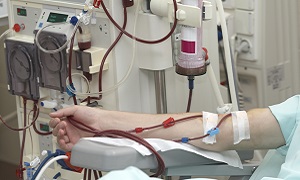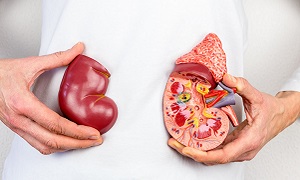Glomerulonephritis
Glomerulonephritis is a condition where the tiny filters in your kidneys, i.e. glomeruli, get inflamed. Glomeruli help you to remove excess fluid and waste from your bloodstream, which is then passed into your urine. This condition can come on suddenly or develop gradually. Both types may be fatal.
Glomerulonephritis can occur on its own or sometimes it may be a complication of another disease such as diabetes or lupus. Your kidneys can get damaged if there is severe or prolonged inflammation caused by glomerulonephritis. Therefore, early diagnosis and treatments are quite important.
Symptoms
Symptoms that you experience usually depend on what type of glomerulonephritis you are having and the severity of the condition.
Symptoms of acute glomerulonephritis include the following:
- Puffiness in your face
- Extra fluid in your lungs, which can lead to coughing
- Urinating less often
- Blood in your urine
- High Blood Pressure
The chronic form of glomerulonephritis can sometimes occur without any symptoms. There might be slow development of symptoms that are similar to the acute form. Some of the symptoms include the following:
- Blood or excess protein in your urine, which may be microscopic and show up in urine tests
- High blood pressure
- Pain in the abdomen
- Frequent nosebleeds
- Swelling in your ankles and face
- Frequent nighttime urination
- Bubbly or foamy urine, caused by excess protein
In some cases, your glomerulonephritis might get so advanced that it can lead you to develop kidney failure. Some of the symptoms of this can include the following:
- Fatigue
- Lack of appetite
- Nausea and vomiting
- Insomnia
- Muscle cramps at night
- Dry and itchy skin
Causes
Several conditions can lead to glomerulonephritis. The disease is also sometimes known to run in families. In other cases, the disease may be unknown.
The following causes can lead to inflammation of the glomeruli:
Post-streptococcal glomerulonephritis- Glomerulonephritis can develop some days after you recover from a strep throat infection or, in rare cases, a skin infection. To combat the infection, your body is going to produce extra antibodies that may eventually settle in the glomeruli, and lead to inflammation.
This type of glomerulonephritis is more common among children than adults. But they are also likely to recover more quickly.
Bacterial endocarditis- Bacteria can spread occasionally through the bloodstream and lodge in your heart, leading to an infection of one or more of your heart valves. If you have a heart defect, such as a damaged or artificial heart valve, then you are at a greater risk. Bacterial endocarditis is associated with glomerular disease, though the connection between the two is still unclear.
Viral infections- There are several viral infections, such as the human immunodeficiency virus (HIV), hepatitis B, and hepatitis C, which can also cause glomerulonephritis.
Goodpasture’s syndrome- This is a rare immunological lung disorder that is similar to pneumonia. Goodpasture’s syndrome leads to bleeding in your lungs as well as glomerulonephritis.
Lupus- This is a chronic inflammatory disease, which can affect many parts of your body, such as your joints, skin, blood cells, heart, kidneys, and lungs.
IgA nephropathy- This condition is characterized by recurrent episodes of blood in the urine. This primary glomerular disease is a result of deposits of immunoglobulin A (IgA) in the glomeruli. IgA nephropathy can progress for years without any noticeable symptoms.
Polyarteritis- This is a form of vasculitis which affects small and medium blood vessels in several parts of your body, like your heart, kidneys, and intestines.
Granulomatosis with polyangiitis- This form of vasculitis, which is formerly known as Wegener’s granulomatosis, can affect small and medium blood vessels in your lungs, upper airways, and kidneys.
High blood pressure- High blood pressure can damage your kidneys and impair their ability to function normally. Glomerulonephritis can also lead to high blood pressure since it reduces kidney function and can also influence how your kidneys handle sodium.
Diabetic kidney disease (diabetic nephropathy)- This can affect anyone having diabetes, generally taking years to develop. Good control of blood sugar levels and blood pressure can however prevent or slow kidney damage.
Focal segmental glomerulosclerosis- This condition is characterized by scattered scarring of some of the glomeruli, and it can result from another disease or sometimes occur for no known reason.
Infrequently, chronic glomerulonephritis also runs in families. One inherited form, Alport syndrome, may impair one’s vision or hearing.
Glomerulonephritis is associated with certain cancers as well, such as multiple myeloma, lung cancer as well as chronic lymphocytic leukemia.
Diagnosis
Glomerulonephritis is often detected during a routine urine analysis. Tests to assess your kidney function and for diagnosis of glomerulonephritis can include:
Blood tests
Urine test
Imaging tests
If your doctor detects evidence of damage, he/she can recommend a kidney X-ray, a CT scan, or an ultrasound exam.
Kidney biopsy
Treatment
Treatment is going to depend on several factors such as whether the condition is acute or chronic, the underlying cause, as well as the severity of the symptoms.
Medication
Glomerulonephritis after a strep infection should generally clear up without any treatment, though your doctor might prescribe antibiotics to kill the pathogens that are causing the infections. However, the patient will also likely need to reduce the intake of fluids as well as avoid food and drinks containing alcohol or high levels of protein, potassium, or salt.
Dialysis
Kidney transplant
A kidney transplant can be possible if the individual is healthy. However, for people who cannot undergo a transplant, dialysis is the only option.
Complications
Glomerulonephritis can cause severe damage to your kidneys, making them lose their filtering ability. Some of the possible complications of glomerulonephritis include:
High blood pressure- Damage to your kidneys and the resulting buildup of wastes in your bloodstream may eventually cause your blood pressure to rise.
Acute kidney failure– Loss of function in the filtering part of the nephron can lead to rapid accumulation of waste products. Due to this, you might require emergency dialysis, which is an artificial means of removing extra fluids and waste from your blood, using an artificial kidney machine.
Chronic kidney disease– In this condition, your kidneys lose their filtering ability. Kidney function that deteriorates to below ten percent of normal capacity results in end-stage kidney disease, which can require dialysis or a kidney transplant to help sustain life.
Nephrotic syndrome- With this syndrome, too much protein in your urine causes too little protein in your blood. Nephrotic syndrome may be associated with high blood cholesterol as well as swelling of your eyelids, feet as well as the abdomen.
Prevention
Although most forms of glomerulonephritis are not preventable, there are some ways to reduce the risk.
Some of the ways include the following:
- Seek medical attention if you have a strep infection causing a sore throat or impetigo
- Practice safe sex
- If you have blood pressure or diabetes, keep it in control
- Avoid the use of illegal intravenous drug as well as sharing needles
A healthy lifestyle with proper exercise, proper sleep, and a balanced diet can also help in reducing the risk of glomerulonephritis.







